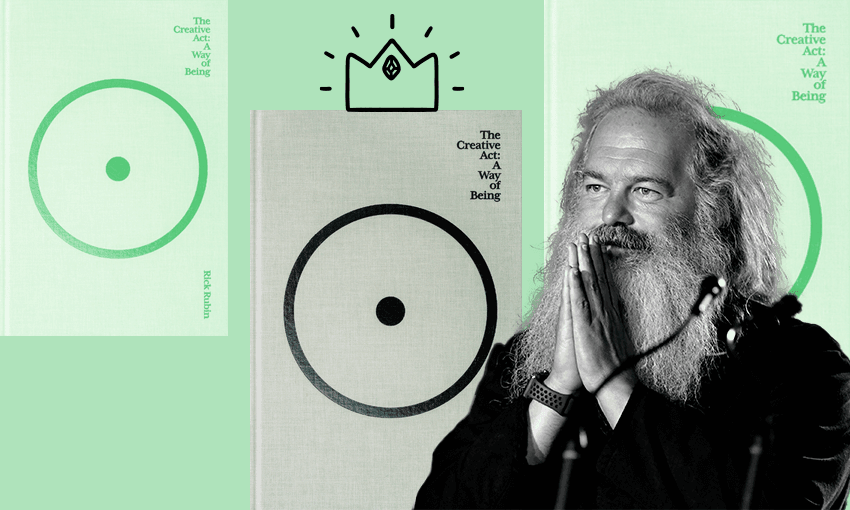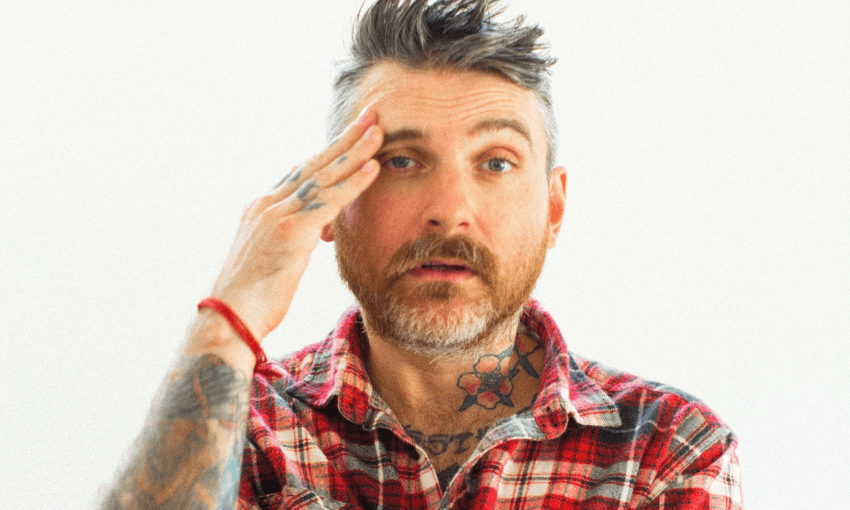Rick Rubin’s creative advice book has been on the bestseller charts for months now. But is it any good? Sam Brooks reviews.
I’m sceptical on books that teach people how to be creative. I’m equally sceptical of hard rules around creativity; the capacity for creation exists within everybody, much like the capacity for kindness, the capacity for evil, the capacity for banality. Any one of us has the potential to be creative, it just so happens that a range of factors, including environment, encouragement and education, allow people the tools to access and exercise that creativity.
A few years ago, when I was mid-season through performing a work in Sydney and disconnected from everything, I bought a copy of The Artist’s Way. If you’re not familiar with the book, it hails from the early-90s, by author Julia Cameron, and is intended to help people with “artistic creative recovery”. If you’ve heard people talk vaguely about doing their “morning pages”, you can point to The Artist’s Way as the culprit. There is a slight Christian bent to it, in the same sort of way where you might not realise a youth group in a town hall that gathers every Friday to sing songs, join hands, and share kai might also have a Christian bent. It has, of course, sold millions of copies worldwide.
I did not find The Artist’s Way particularly helpful, although I know at least two friends who did, and I can only assume the ratio is similar for the other millions of people who have copies of it. I found that the morning pages, essentially free-writing for three pages first thing in the morning to unblock any barriers your brain might have put in place, ended up meaning that I wrote less later in the day. My brain was unblocked, but my creativity was drained as a result.
So, yes. My experience with The Artist’s Way meant that I approached Rick Rubin’s The Creative Act: A Way of Being with an equal amount of trepidation. It didn’t help that it had been a consistent bestseller – in fact, that even worked against the book. A self-help book that works for everybody is, surely, a self-help book that works for almost nobody. My gist is that advice should be specific, not universal, especially when it comes to creativity, which is so deeply personal and unique. Each person’s creativity is its own snowflake, making its way to the ground in its own path, and very rarely linearly.
It also didn’t help that I had been misreading the bestseller lists for months, and thought that Rick Ross wrote this book. Now, I love “Aston Martin Music” more than the average man, but I was curious as to why the average Unity Book reader was flocking to buy his book. Rick Rubin, for the record, has worked with artists that range from Public Enemy, Taylor Swift, Run DMC, Adele, Slayer, Jazzy Jay, Kae Tempest, Andrew Dice Clay, Linkin Park, Shakira, Audioslave, Kanye West, Vanessa Carlton, et al et al. He is not Rick Ross.
But, the book. Is it any good?
I felt good after reading The Creative Act. There are a lot of good sentences in the book. It also feels good to read The Creative Act, because the book’s cover is a soft blue linen-type fabric and it is a hefty weight. The Creative Act is split up into 78 chapters or “areas of thought”, as Rubin calls them (the man has many phrases that complicate the meaning of otherwise simple words throughout). These areas of thoughts have chapters like “Everyone is a Creator”, “Ending to Start Anew (Regeneration)”, “The Sincerity Dilemma” and “Why Make Art?”
If you found that paragraph strange to read, that is because I have tried to mimic Rick Rubin’s style of writing. Each area of thought is made up of very short sentences that feel pretty good to read. Take this fragment, from page 52:
“Nature transcends our tendencies to label and classify, to reduce and limit. The natural world is unfathomably more rich, interwoven and complicated than we are taught, and so much more mysterious and beautiful. Deepening our connection to nature will serve our spirit, and what serves our spirit invariably serves our artistic output.”
I broadly agree with these sentiments, because they’re pretty easy to agree with. But reading this cadence, and this tone, for 400 pages has the odd effect of flattening out everything. Many of the sentences could be placed in any order, hell, any chapter (area of thought, sorry) and have similar effect. I put down the book feeling a little bit better about my own creativity, but with very few specific thoughts on the creative act. And that’s from someone who was taking notes!
There’s the occasional exception to this writing, however, and it’s where Rubin starts to talk about the practicalities of his own creation – being a master in the studio. Compare this passage to the previous:
“A technique we sometimes use in the studio is to turn up the volume on the headphones extremely loud. When every sound explodes in your ears, there’s a natural tendency to play much quieter to restore the balance. It’s a forced perspective change and can bring out a very delicate performance.”
When talking about his own creative practice, the mists suddenly part. There is clarity, meaning, and hell, even concrete nouns. This perhaps speaks to my own practice and preferences. As a writer, whose practice involves the arrangement of words for meaning and impact, I value specificity and clarity over broadness and scope. The part of the book that I found most helpful, which I won’t spoil for you here, hit me like a tonne of bricks and has kept me thinking ever since (hint: it’s about self-expression and who it is actually for). Most of the book washed over me like chemist perfume; pleasant, but not something I’d ever put on myself.
I am not the target audience for The Creative Act. I’m a working artist who writes every day. The easiest thing I do in a day is write. I love it more than anything, and I feel blessed that people not only pay me to do it, but also tend to like what I write (although several emails in my inbox suggest this is not a universal experience).
If you’re feeling blocked, this book is probably for you. If you want a winding pathway to your own creativity, this book is definitely for you. If you’re an artist with your own creative practice but feeling a bit lost, you probably can’t afford this book ($50!) but should put a hold on it at your local library. If you just want to understand creativity a little bit better, and look at the world around you, and the creativity that inhabits it with clearer eyes, this book is for you.
That covers pretty much everybody, I think.
The Creative Act by Rick Rubin ($50, Penguin) can be purchased at Unity Books Wellington and Auckland (or borrowed from your local library).



